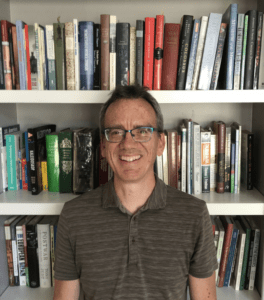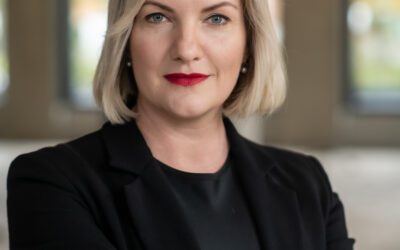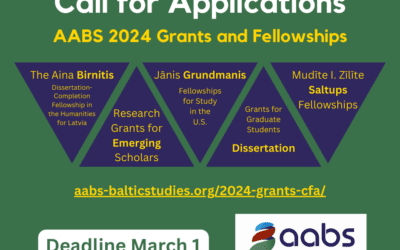AABS is pleased to recognize Charles Perrin for his completion of the project “Forgotten Prisoners of the Tsar: East Prussian Deportees in Russia during World War I,” for which he received the Research Grant for Emerging Scholars.

©Charles Perrin, 2022
Dr. Charles Perrin is a Part-Time Assistant Professor at Kennesaw State University, Georgia, in the United States. His research focuses on several themes in the history of modern Lithuania, including the national movement in the late nineteenth and early twentieth centuries, anti-Semitism, and deportations during World War I.
The Impact of an Award: Report from Charles Perrin
After the completion of his project, Charles Perrin submitted a reflection to AABS.
We thank him for his permission to publish his thoughts, which have been lightly edited.
In 2021 I was awarded an AABS Emerging Scholar Grant to conduct research in several archives and libraries in Europe about the deportation, internment, and repatriation of East Prussian civilians during World War I. At that time my research topic was relatively obscure. Russia’s full-scale invasion of Ukraine, however, has given my topic renewed relevance. According to Iryna Vereschuk, the Deputy Prime Minister of Ukraine, in March of this year about 45,000 residents of Mariupol were deported by the Russian military to the self-proclaimed People’s Republic of Donetsk and Russia. Mariupol is only one city. The true scale of the deportation of civilians from Russian-occupied Ukraine is probably much larger.
When I applied for the Emerging Scholar Grant the Covid-19 pandemic had already begun and the reading rooms in some of the institutions that I had planned to visit were closed. Although these reading rooms had reopened by the summer of 2021, access was severely limited. I therefore decided to delay my research trip until the summer of this year. This long delay, however, was a blessing in disguise. I used the delay to ask archivists at the archives that I planned to visit for reference assistance and to search the online catalogs of these archives for records that might be useful for my research. My plans changed as a result. For example, using invenio, the online catalog of the German Federal Archives, I found photographs of East Prussian deportees in Russia, which are very rare. I also learned that it was possible to order digital copies of these photographs through an archival services company. This made it unnecessary to visit the branch of the Federal Archives where these photographs were housed in person.
After a one-year delay, I was finally able to conduct my proposed research. I visited seven libraries and archives in Germany, Lithuania, and Sweden. These institutions house archival and published sources for the study of East Prussian deportees that are not available online or in libraries in the United States. The main activity that I engaged in was skimming the text of these sources and photographing those pages that were relevant to my research. By an incredible stroke of good luck, one of the last sources that I photographed in the Berlin State Library provided a key piece of information about where to look in the Swedish National Archives for sources about East Prussian deportees. At the Swedish National Archives I discovered, to my pleasant surprise, that the officials in the Swedish Foreign Ministry and the delegates of the Swedish Legation in Petrograd who wrote reports and letters about or related to East Prussian deportees either wrote them in German (a language that I can read) or in Swedish accompanied by a German translation. (German interests in Russia were represented by Sweden from 1917–1918.) In Berlin I had enough time to look through almost all of the sources that I had identified as being relevant to my research. Unfortunately, I did not have enough time to look through all of the sources that are relevant to my research at the Swedish National Archives in Täby (Arninge). I plan to visit this archive again next summer.
The sources that I photographed are in five languages (German, French, Swedish, English, and Russian). Some of these sources were written using Kurrent, an old form of German handwriting, or were printed using Fraktur, a style of blackletter type. Kurrent is notoriously difficult to read, especially if the writer had bad handwriting. Fraktur is less difficult to read than Kurrent, but still slows down the reading process. To facilitate the transcription of these sources I am using Transkribus Lite, an online text recognition tool.
Since I began working on this project, I have created an annotated bibliography to help organize the many sources that I have discovered. I am currently updating this bibliography by adding the sources that I photographed during this past summer.
I plan to submit a paper proposal based on my research at the 15th Conference on Baltic Studies in Europe, which will take place from June 15-17, 2023 at Vytautas Magnus University in Kaunas, Lithuania. One possible topic for this paper is the relations between ethnic German and Prussian Lithuanian deportees interned in Simbirsk. This town had the largest number of East Prussian deportees of any internment site in Russia (about 2,400 in 1915) and the sources indicate the existence of growing tension between the two groups after changes in the administration of relief in early 1917. Assuming that my proposal is accepted, I will submit the paper for publication in a peer-reviewed journal.
I have applied for a National Endowment for the Humanities (NEH) Fellowship to write a book-length manuscript about the deportation, internment, and repatriation of East Prussian civilians during World War I. Regardless of whether or not I am awarded this fellowship I plan to begin working on the manuscript in January 2023. I will also be applying for an NEH Summer Stipend for the purpose of writing several chapters in the fall of 2023. NEH grants cannot be held concurrently, so, in the unlikely event that I am awarded both grants, I will decline the NEH Summer Stipend.
The Emerging Scholar Grant allowed me to fill significant gaps in the research that I have already conducted in Lithuania and Poland. I would like to express my thanks to the AABS for awarding me this grant. Like the two other grants that I have received for the same project, this grant is like a stepping-stone across a stream that brings me ever closer to the other side.
– Charles Perrin, 2022
Charles Perrin
What is the Emerging Scholars Grant?
The Research Grant for Emerging Scholars is an award for up to $6,000, to be used for travel, duplication, materials, equipment, or other needs as specified. Proposals are evaluated according to the scholarly potential of the applicant and the quality and scholarly importance of the proposed work, especially to the development of Baltic Studies. Applicants must have received PhD no earlier than January 1, 2013. Applicants must be AABS members at the time of application.
The application deadline for academic year 2023-2024 is February 1, 2023. Applications will be evaluated by the AABS 2023–2024 Grants Committee consisting of AABS VP for Professional Development Dr. Kaarel Piirimäe, AABS President Dr. Dovilė Budrytė, and AABS Director-at-Large Dr. Daunis Auers. Award notifications will be made in April 2023.
Other Grants and Fellowships News
Vanished Lands: Book Publication Subvention Report by Laima Vincė Sruoginis
The Association for the Advancement of Baltic Studies (AABS) is pleased to recognized the successful conclusion of a Book Publication Subvention Grant awarded to Peter Lang Publishers for publishing the book Vanished Lands: Memory and Postmemory in North American...
Elīna Vikmane Birnitis Fellowship Report on Advancing Cybermuseology
AABS is pleased to recognize Elīna Vikmane for the completion of her dissertation "Advancing Cybermuseology: Diffusion of digital innovation in Latvia’s museum sector," for which she received the 2022–2023 Aina Birnitis Dissertation-Completion Fellowship in the...
AABS 2024 Grant and Fellowship Applications Open
Call for Applications AABS 2024-2025 Grants and Fellowships Research Grants for Emerging Scholars The Aina Birnitis Dissertation-Completion Fellowship in the Humanities for Latvia Mudīte I. Zīlīte Saltups Fellowships Jānis Grundmanis Fellowships for...



